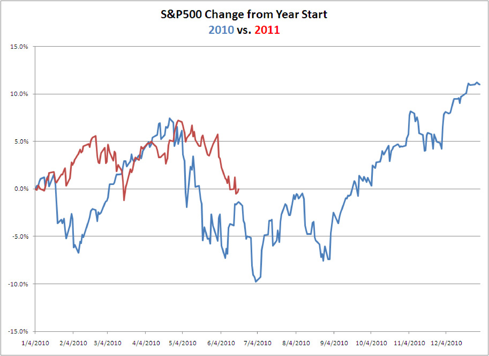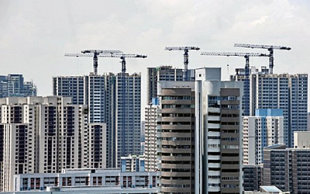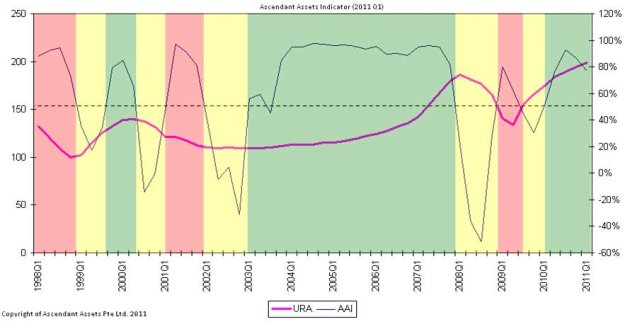Why China’s Heading for a Hard Landing, Part 1: A. Gary Shilling
Illustration by Jonathan Zawada
Few countries are more important to the global economy than China. But its reputation as an unstoppable giant -- as a country with an unending supply of cheap labor and limitless capacity for growth -- masks some serious and worsening economic problems.
China’s labor force is aging. Its consumers save too much and spend too little. Its political and economic policy tools remain crude. Its state bureaucracy seems likely to curb spending just as exports weaken, and thus risks deflation. As U.S. consumers retrench, and as the global commodity bubble begins to dissipate, these fundamental weaknesses will combine in a way that’s unlikely to end well for China -- or for the rest of the world. To start, China is much more vulnerable to an international slowdown than is generally understood. In late 2007, my firm’s research found that too few people in China had the discretionary spending capability to support its economy domestically. Our analysis showed that it took a per-capita gross domestic product of about $5,000 to have meaningful discretionary spending power in China.
About 110 million Chinese had that much or more, but they constituted only 8 percent of the population and accounted for just 35 percent of GDP in 2009, while exports accounted for 27 percent. Even China’s middle and upper classes had only 6 percent of Americans’ purchasing power.
Why Overconfidence Abounds
With such limited domestic spending, why do so many analysts predict that China can continue its robust growth?In part because they believe in the misguided concept of global decoupling -- the idea that even if the U.S. economy suffers a setback, the rest of the world, especially developing countries such as China and India, will continue to flourish. Recently -- after China’s huge $586 billion stimulus program in 2009; massive imports of industrial materials such as iron ore and copper; booms in construction of cement, steel and power plants, and other industrial capacity; and a pickup in economic growth -- the decoupling argument has been back in vogue.
This concept is flawed for a simple reason: Almost all developing countries depend on exports for growth, a point underscored by their persistent trade surpluses and the huge size of Asian exports relative to GDP. Further, the majority of exports by Asian countries go directly or indirectly to the U.S. We saw the effects of this starting in 2008: As U.S. consumers retrenched and global recession reigned, China and most other developing Asian countries suffered keenly. Overconfidence in China’s ability to keep its economy booming is also partly psychological. It reminds me of the admiration and envy (even fear) that many felt toward Japan during its bubble days in the 1980s. As Japanese companies bought California’s Pebble Beach, Iowa farmland and Rockefeller Center in New York, what was safe from their zillions? Then the Japanese stock and real-estate bubbles collapsed, and Japan entered the deflationary depression in which it’s still mired.
Success and Complacency
What’s more, China’s recent successes have been so pronounced that they’ve led many to conclude that its economy is a juggernaut. And, indeed, the Chinese have much to be proud of: Last year, China passed Japan to become the world’s second largest economy, a huge achievement considering China started in the late 1970s with a tiny pre-industrialized economy.But this success may have led to complacency. I suspect that the 2007-2009 global recession, and the dramatic transformation by U.S. consumers from gay-abandon borrowers-and- spenders to Scrooge-like savers, caught Chinese leaders flat- footed. They probably planned to encourage consumer spending and domestic-led growth, but later -- much later.
Growth Machine
They were enjoying a well-oiled growth machine. Growing exports, especially to American consumers, stimulated the capital spending needed to produce yet more exports and jobs for the millions of Chinese streaming from farms to cities. Wages remained low, due to ample labor supplies, and held down consumer spending. So did the high Chinese consumer saving rate. Because Chinese could not invest offshore, much of that saving went into state banks at low interest rates. The money was then lent to the many inefficient government-owned enterprises at subsidized rates.
In a country where stability is almost worshipped, why would any leader want to disrupt such a smoothly running economy? But before you worry about China’s becoming No. 1 any time soon, consider the remaining gap between its economy and the U.S. economy. In 2009, China’s GDP was $4.9 trillion, only 34 percent of the U.S.’s $14.3 trillion. Because China has 1.32 billion people, or 4.3 times as many as the U.S. has, the gap in per-capita GDP was even bigger: China’s $3,709 was only 8 percent of the U.S.’s $46,405.
A Wide Gap
Just to maintain this gap at current levels, Chinese GDP will need to grow at double-digit rates for four years before tapering off, or rise sixfold in three decades (assuming that U.S. real GDP increases 2 percent per year on average for the next 30 years, and using government population projections). To close the per-capita GDP gap in 30 years, Chinese GDP would need to grow about 10 percent per year for three decades, or expand to 17.8 times its current size in that period.Such rates of growth seem close to impossible if the global economy slows.
As the announcer for the Cleveland Indians used to say when the Tribe was hopelessly behind, “They have their work cut out for them!”
(A. Gary Shilling is president of A. Gary Shilling & Co. and author of “The Age of Deleveraging: Investment Strategies for a Decade of Slow Growth and Deflation.” The opinions expressed are his own. This is the first in a five-part series.) Shilling: China Heading for a Hard Landing, Pt. 2
Illustration by Jonathan Zawada
China has become an economic giant because it has so many people who are producing moderate amounts. In most ways, however, China remains an underdeveloped country with political and economic policy tools that are crude by Western standards. Those tools can spur impressive growth --but they also mask some deep structural weaknesses in China’s economy.
It’s relatively easy for developing countries to grow by emulating the technology of advanced nations or, in China’s case, by forcing them to share it as the price of doing business or by simply stealing it.
And a tightly controlled economy can get results quickly. That’s what happened with China’s $586 billion stimulus program introduced in 2009. Growth in gross domestic product leaped from a 6 percent rate in early 2009 back to double digits. Most of the money was channeled through government-controlled banks, whose lending increased by $1.4 trillion, or 32 percent, over the course of 2009 after being flat since early 2006. The money supply increased by 29 percent.
Those loans financed public and industrial infrastructure and real estate. Property prices in January 2010 were up 9.5 percent from a year earlier, according to government numbers, and much more by private realistic estimates. Employment gained along with economic activity, and in the third quarter of 2009, there were 94 job openings for every 100 applicants, up from 85 in depressed 2008, and close to the pre-crisis average of 97. Unsustainable Growth
Here’s what we should remember: This kind of growth is unsustainable, and it won’t be able to cover up China’s underlying vulnerabilities forever.China’s reliance on exports and a controlled currency for growth, for instance, will no longer work if U.S. consumers are engaged in a chronic saving spree, as I believe they will be. Chinese export growth, which averaged 21 percent per year in the last decade, is bound to suffer.
The country’s seemingly inexhaustible pool of cheap labor is expected to peak in 2014, in part due to its rigid one-child policy. By some estimates, ample labor has boosted GDP growth by 1.8 percentage points annually since the late 1970s, but the contraction of the working-age population will reduce growth by 0.7 percentage points by 2030.
Wages and Ages
Wages are already rising, and even Chinese manufacturers are moving production to Vietnam and Pakistan, where pay levels are a third of China’s. Some factory workers have seen wage increases of 20 percent to 30 percent in the last year or so, with those producing goods for foreign companies seeing especially large boosts. At the same time, better conditions in rural areas have reduced the flow of cheap labor into coastal cities.
As the Chinese population ages, the ratio of retirees to working-age people is forecast to rise from 39 percent last year to 46 percent in 2025. This does not bode well for China’s future growth. When Communist Party leaders transitioned China’s economy from a cradle-to-grave nanny state to a progressively free-market one starting in 1978, no meaningful unemployment, retirement or state health systems were instituted. (Although President Hu Jintao said in October that China will “institute a social safety net that covers all,” and the government has set a goal of providing basic medical care for all Chinese by 2020.)
Prodigious Saving
So the Chinese must save prodigiously to provide for their welfare and retirement. This has contributed mightily to China’s high rate of saving and low rate of spending, and its consequent reliance on exports. Chinese households save close to 30 percent of income on average, in large part to cover old age and medical costs.Yes, the Chinese saving rate will be pushed down in time by aging Chinese who still consume but no longer work, much as it has in Japan. Nevertheless, less saving and more Chinese consumption won’t substitute for weakening exports any time soon. Chinese consumers buy only about one-tenth of those in Europe and the U.S. combined. As the euro zone remains troubled, and the U.K. slashes government stimulus and U.S. consumers continue to retrench, it’s unlikely that a drop in Chinese saving could offset the negative effects of reduced exports.
Inflation Looming
Finally, China’s state-controlled economic boom may soon lead to crippling inflation. In February 2010, the director of the National Bureau of Statistics said that “asset-price increases pose a challenge for macroeconomic policy.”The housing boom has pushed up prices to the point that apartments in Beijing are affordable to only the top 20 percent of earners -- they’re selling at about 22 times average income (average U.S. house prices peaked at six times average income). A square meter of property in China costs an estimated 164 times per-capita income, compared with 33 times in high-priced Japan.
The 2009 stimulus package also spurred consumer price inflation to a year-over-year acceleration of 5.5 percent in May. Food prices are very sensitive politically because so many Chinese are at subsistence incomes, and they rose 11.7 percent in May from a year earlier. Chinese leaders are not amused, and are taking stringent restraining actions. But with only blunt-force economic tools available, it’s not clear that they’ll be capable of managing a controlled slowdown without significant pain.
(A. Gary Shilling is president of A. Gary Shilling & Co. and author of “The Age of Deleveraging: Investment Strategies for a Decade of Slow Growth and Deflation.” The opinions expressed are his own. This is the second in a five-part series.)





